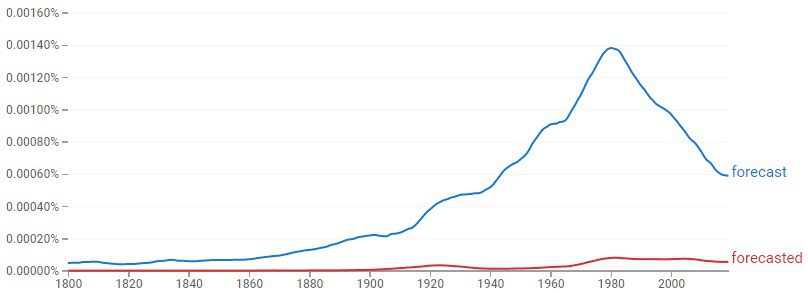Both forecast and forecasted are widely used as the past tense and past participle of the verb forecast, but the uninflected form is more common.
Find out the difference between forecast and forecasted and why the irregular form is more popular. I’ve even got some examples of how to use the word in a sentence.
Forecast or Forecasted
There is very little difference between forecast and forecasted because both are correct forms. But the irregular verb ‘forecast’ is preferred over the -ed inflected form. Many other verbs do not change in their past tense forms.
Forecast Past Tense and Past Participle
Forecast is both a regular and irregular verb such as laid that may stay in its base form for past and past participle forms. That means their past and past participle forms are still the -cast form instead of the variant -ed past participle. Here’s are some examples:
But at the same time, other studies have forecast that warmer temperatures will reduce the wind shear necessary to turn a routine thunderstorm into a powerful system that can give birth to tornadoes. [Time]
- Last year, they forecast that a company’s corresponding pseudo-conglomerate returns dictate future price movements.
You can also use it in regular form, meaning the simple past and past participle forms are forecasted. This situation is a rare instance in English verb morphology. In fact, any newly invented verb is usually regular before it becomes irregular.
Even though regular verbs outnumber irregular verbs, forecasted is still less common than the irregular forecast–for example:
- They forecasted a storm coming this weekend.
- The organization forecasted the tax evader’s loss.
- Snow is forecasted for tomorrow.
Here are other examples that are not regular verbs:
- input(ted).
- output(ted).
- broadcast(ed).
- podcast(ed).
- offset(ted).
Most dictionaries recognize both forms for these verbs. But many spellcheckers flag forecasted, inputted, broadcasted, and more.
Forecasted Adjective
Aside from the debate on the regular and irregular form of forecast, the word forecasted’s other distinction with forecast is that it can be an adjective.
As an adjective means that has been forecast–for example:
- The forecasted sales depend on marketability and star power.
- The forecasted figures are not entirely accurate.
- These documents contain information on our balances, income, and forecasted earnings.
Forecast as a Noun
The noun forecast also means a prediction of future events in a single occurrence, especially weather or financial trends. Here are some sentence examples:
- What is the weather forecast for tomorrow?
- The government fears a pessimistic economic forecast.
- The long-term forecasts are challenging to make with the unpredictable sales.
- The forecast says it will be cloudy this week.
The original noun form might be responsible for the confusion on forecast vs. forecasted. These alternative forms show two different views on the word.
Common verbs that come from nouns always follow the regular -ed pattern. If we analyze forecast as deriving from a noun, forecasted is correct. But if we examine it based on the irregular verb within it, then the past form is forecast.
This is the idea of Stephen Pinker in The Language Instinct. He states that verbs from nouns are a part of a different mental lexicon compared to verbs from verbs.
People subconsciously analyze them in different ways, which many find amusing.
Why Forecast is More Common
In 1926, Modern English Usage recognized forecast as the correct form for the past and past participle. The author discusses that the accurate term depends on whether it’s a verb from verb or verb from noun.
The verb was recorded 150 years earlier than its noun counterpart. Therefore, forecast is more acceptable than forecasted.
The author says, “We may therefore thankfully rid ourselves of the ugly forecasted; it may be hoped that we should do so even if history were against us, but this time it is kind.”

Forecasted in a Sentence
Many forecasted that Mitt Romney would defeat President Obama in the 2012 presidential election. [Guardian]
[T]he forecasted demand for bioartificial organs—cellular, autograft, allograft, and xenograft transplants—is estimated to be in the billions of dollars per annum. [Nature]
The company’s analysts had forecast it would take as long as nine months to find that many qualified engineers in the United States. [New York Times]
To demonstrate his orthodoxy and his attachment to the Church and its triumph he composed works in which he forecasted its universal greatness. [History of Italian Philosophy, Eugenio Garin]
So, Which One is It?
Both forecast and forecasted are the correct past tense common form of forecast. But forecast is more widely accepted by dictionaries, linguists, and online spellcheckers. They believe that the verb does not come from a noun and should therefore follow the irregular form.
In short, use the base form forecast as the simple past and past participle form of the verb.
